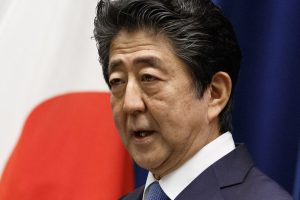It is hard to imagine a Japanese leader who visited the Yasukuni Shrine would be mourned in China when he died – but that’s what happened since the assassination of Abe Shinzo.
The killing of Japan’s former prime minister on July 8 tore China’s public opinion apart. One camp, marked by its usual strident nationalist tone, rejoiced at the incident in an unseemly outburst of schadenfreude. Another group, more capable of compassion and empathy, cautioned against gloating over a neighbor’s loss.
In China, where consensus is elusive on almost anything, a controversial figure like Abe can only polarize society even further.
In China, Abe is doubtless one of the most resented contemporary Japanese politicians, alongside his ultranationalist mentor Koizumi Junichiro and Ishihara Shintaro, the former governor of Tokyo who was notorious for denying the Nanjing Massacre.
A series of Abe’s gestures, from his quest for constitutional revision to permit collective self-defense and his meddling in the Taiwan issue to his deliberately provocative Yasukuni visit after his resignation in 2020, deeply irked large swaths of the Chinese population and turned him into a hated figure.
Abe was a less successful politician than many now care to admit. Despite his role as Japan’s longest-serving post-war prime minister, on his watch Japan barely tinkered with its sclerotic political system.
To his chagrin, the vaunted Abenomics failed to reap the desired results. Deflation remains Japan’s biggest economic scourge. And despite “womenomics,” gender disparities persist, although women did enter the work force in record numbers.
As Tobias Harris demonstrated in his biography on Abe, despite enjoying a comfortable majority in both houses of the Japanese parliament for his eight-year tenure, Abe had little to boast about, leaving behind “a legacy of missed opportunities and unfinished business.”
On the diplomatic front, he did little to improve Japan’s relations with China; on the contrary, ties soured further. Various polls suggest that the proportion of Japanese and Chinese citizens locked in mutual disparagement has approached new highs.
So how did Abe’s murder trigger an unlikely outpouring of sympathies in China? An easy answer is that it is a universal norm to mourn the deceased, but more importantly, his death provided an outlet for pent-up frustrations at being unable to speak one’s mind without being harassed.
In China’s cyberspace, even the slightest perceived approval of Japan – and the United States, for that matter – is dismissed as heresy today, with a posse of nationalist vigilantes given to ganging up on the alleged “Japan-hugger.” Derogatory labels such as “spiritual Japanese” are applied loosely to tarnish one’s reputation. Even on less politically sensitive topics, it takes enormous courage to openly give credit to Japan where credit is due.
Many liberal-minded Chinese are not necessarily aware of Abe’s exploits or less palatable streak; their mourning of the politician is more likely inspired by a yearning to speak freely without bullying by online trolls.
In an apparent attempt to depict Abe as an admirable, caring politician, many posted videos of him playing the piano to pray for a world bruised by the COVID-19 pandemic. In another video, Abe is shown announcing a fee waiver for kindergartens across Japan to boost the fertility rate.
Abe also drew praises for his role in aiding China’s early COVID-19 response in 2020, when he called on fellow Liberal Democratic Party members of the Diet to each donate 5,000 yen ($36.50) to China – a small sum yet a big token of genuine kindness, many said.
Intriguingly, one can see how Abe’s image has oscillated over the past few years in Chinese public opinion. Initially portrayed as an icon of right-wing politics, an American stooge, and a historical revisionist representing a Japan unrepentant over its wartime atrocities, Abe is now credited in online posts as a dedicated, affable, and corruption-proof politician. The last merit, however, is imagined rather than real. One of the scandals that culminated in his resignation in 2020 involved a sweetheart land deal that benefited one of his cronies and was subsequently covered up.
But none of that bad publicity seems to matter now. Abe’s death has become literally a rallying cry for many in China who wish to defend their freedom of expression. It also presents an opportunity to showcase one’s empathy and independent thinking.
The last time such an opportunity emerged was after the Russian invasion of Ukraine. Although China’s internet appeared to be lopsidedly in favor of Russia, this perception is a result of cherry-picking in media reports. Many silent opponents of the invasion were just too busy or cynical to fight a war of words they were bound to lose and risk being slammed as “jackals” of America or NATO.
Instead, they used the war as a test of intellectual probity and moral scruples, quietly blacklisting contacts who supported the invasion. This time around, those gleeful over Abe’s killing were similarly added to the blacklist, as quite a few friends told me.
It is perfectly within one’s rights to disdain or pillory a public figure, Abe included. But a healthy society is tolerant of a diversity of voices, and one voice should never be allowed to drown out another through coercion and intimidation.
If anything, the only solace to be found from the tragedy of Abe’s assassination is that a fair number of Chinese citizens, increasingly estranged from the knee-jerk, almost hysterical brand of nationalism, are now standing up for their views, however “unorthodox” they are deemed.

































